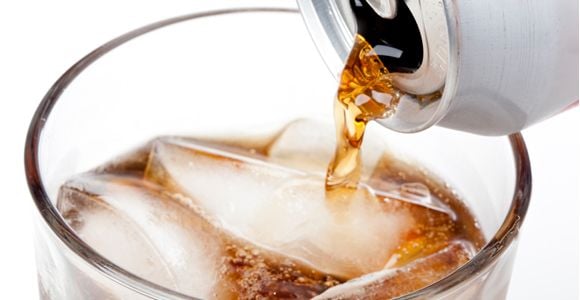As the debate over the correlation between diet soda and weight gain rages on, a new study published in Nature claims that artificially sweetened beverages can cause glucose intolerance and increase the risk of developing diabetes because of their effect on bacteria in our digestive tract. Diabetes is the 7th leading cause of death in the U.S., and an estimated 29.1 million Americans are living with the disease.
The term "glucose intolerance" is a way of describing problems with metabolism, which can result in higher than normal blood sugar levels. Over time, this can increase the risk for developing diabetes. The findings from the study conducted by researchers at the Weizmann Institute of Science could affect a huge portion of our population, largely due to the fact that many people drink non-caloric beverages, such as diet soda, as these do not raise blood sugar.
The results of this new study stem from activity within gut microbes, or the "microbiome" types of bacteria living in our intestines, which is supposed to be there. Humans have more bacteria in their guts than cells in their bodies, and there are an estimated 160 bacterial species in each of us. The type of bacteria depends on the way we were born, how we were fed as children, what we eat as adults, as well as every antibiotic or other medication we have ever taken.
Intestinal bacteria are a good thing. They support our immune system and produces vitamins K and B12. Though this area of research is relatively new, scientists are starting to discover that a person's unique microbiome can control the immune system, digestion, weight, behavior and moods, and even diseases like diabetes. In the recent study about glucose intolerance, the introduction of artificial sweeteners appeared to allow some gut bacteria to grow and others to get pushed aside.
The study showed that the introduction of artificial sweeteners -- including saccharin, aspartame and sucralose -- to the intestines of mice could change the composition and function of the good bacteria living there, thereby leading to problems with blood sugar.
When the researchers found their mice were developing insulin resistance, they went on to analyze data from 400 human subjects. With this information, they found that the people who were heavy consumers of artificial sweeteners had higher blood sugar marker labs than those who did not consume them. This was unexpected, as artificial sweeteners are often used because they do not raise blood sugar upon consumption.
After making the discovery, researchers ran a small study with seven human subjects who consumed between 10 and 12 artificial sweetener packets per week, which was designated as a "high consumption" amount. Even after a short-term exposure period, the majority of the subjects developed problems with their blood sugars. Though the study only contained seven subjects, these results were alarming because with long-term elevated blood sugar or glucose intolerance, a person could develop diabetes.
Keep in mind that additional studies are necessary in order to gain more knowledge of this new concept. Microbiome studies are complicated because no two people will have the same composition of bacteria, as well as by the fact that not every person who consumes artificial sweeteners will be diagnosed with diabetes. With all of the previous controversy surrounding these beverages and new research coming out, though, it might be best to steer clear of them for now. Opt for water, plain seltzer or tea instead.

Ginger Hultin, MS, RD, LDN is a Chicago-based dietitian who specializes in integrative oncology. With a Master's degree from naturopathic Bastyr University, she practices plant-based nutrition and specializes in lab interpretation and appropriate supplementation. Ginger also had a passion for fitness and maintains both group fitness and personal training certifications.



